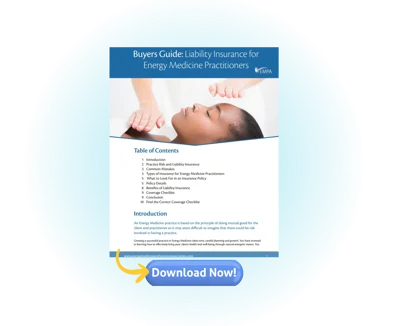When a Client Gets Hurt: What Energy Healers Need to Know
August 4th, 2025
3 min read
By Anya Charles

It's the phone call every energy healer dreads. Your client from last week is on the line, and they're upset. They say they've been experiencing headaches since your session, or that they feel "off" somehow. Maybe they're convinced your work caused it. Maybe they're even talking about filing a complaint.
Your stomach drops. You know you followed all your training. You filled out your session paperwork, you were kind, respectful, and stayed within your scope of practice. But now you're facing something you never expected: a client who believes they were harmed during your session.
If this scenario sounds uncomfortable - scary, even - know that there are safeguards you can have in place to protect yourself, your clients, and your practice if something like this happens.
The truth is, even the most skilled and careful practitioners can find themselves in situations like this. It's not necessarily that you are in trouble for doing something wrong. It’s the reality that healing work, no matter how gentle, can sometimes lead to unexpected reactions or misunderstandings.
The good news? You don't have to face these moments unprepared.
 Accidents Happen
Accidents Happen
Energy healing is subtle. You’re working with intention, presence, and the body’s own energy. So how could someone possibly get hurt?
It may not take something extreme for a client to feel discomfort or to claim harm.
Situations may arise such as:
- A client experiencing a strong emotional reaction and feeling overwhelmed afterward
- An allergic response to a product used during the session, even with consent
- A client fainting unexpectedly during energy work
- Lingering soreness or discomfort linked back to a session, even days later
None of these examples involve negligence. But that’s the thing; liability may not be about whether harm actually occurred. It’s about how a client experiences your work and how they respond to that experience.
When something goes wrong, even unintentionally, you can still be named in a claim.
 What a Claim May Look Like
What a Claim May Look Like
When people think of getting sued, they often picture a dramatic courtroom showdown. In most cases, it doesn’t start that way. It starts with a concern, a complaint, or a letter.
A client might say their back pain worsened after your session. They might report that they felt unsafe or emotionally triggered. In some cases, a claim is filed even when your involvement was minimal – like one of our EMPA members who was named in a lawsuit after someone slipped on ice outside a building where they were speaking!
You don’t have to be at fault to be held responsible. Claims often include everyone involved, and defending yourself can be costly, even if the claim is dismissed.
 How Liability Insurance Protects You
How Liability Insurance Protects You
Liability insurance exists for moments you can’t plan for. Again, not because you’re doing something wrong but because things can still go wrong, or be perceived as having gone wrong.
Professional liability coverage supports you if a client claims they were physically or emotionally harmed by your work. It helps with legal costs, support during the claims process, and, if needed, financial assistance with a settlement.
Having liability insurance means you’re not navigating that process alone. You don't have to choose between helping people and protecting yourself.
EMPA is more than just an insurance provider!
We’re a professional association built specifically for energy and holistic healers - offering coverage, community, education, and resources designed to support the way you work.
 Common Misunderstandings About Liability Risk
Common Misunderstandings About Liability Risk
It’s easy to assume that liability insurance is something only “high-risk” practitioners need. We’ve heard concerns like:
- “I don’t do anything physical, so I’m not worried.”
Energy work is typically subtle, but that doesn’t mean a client won’t link a reaction to your session. - “I’ve never had a complaint.”
Most claims come as a surprise. It only takes one to upend what you’ve worked hard to build. - “I only see a few clients a month.”
Risk isn’t about how busy you are, rather, it’s the potential impact of one session. Whether you see one client or ten, the need for protection stays the same.
Liability coverage isn’t a judgment on how you practice. It’s a safety net for the moments you can’t predict!
Need help sorting it all out? Download EMPA’s free Buyer’s Guide to learn how to choose a policy that fits your practice and protects your work.
 What to Do If Something Goes Wrong
What to Do If Something Goes Wrong
Having a plan helps you stay grounded and respond with clarity.
Here’s what we suggest:
- Stay calm. It’s okay to express care and concern, but avoid making assumptions or taking (or making) blame right away.
- Document everything. Write down what happened during the session, including any client comments or actions you observed.
- Contact your insurance provider promptly. The earlier they’re brought in, the more effectively they can support you.
- Keep your records up to date. Signed informed consent, a clear scope of practice, and brief session notes can make a big difference during a claims review.
Whether or not things escalate, you'll have experienced professionals in your corner who understand exactly what you're going through.
What’s Next: Know You’re Not on Your Own
You can’t control how every client responds to your work. However, you can make sure you’re protected if something goes wrong.
That’s exactly why we created the EMPA Buyer’s Guide. It walks you through the coverage options available to energy healers, helps you understand what to look for, and shows how to choose a policy that fits your practice and your values.
Without that nagging worry in the back of your mind, you can better trust yourself and your process.
Disclaimer: This article is for educational purposes only and does not provide legal, financial, or medical advice. The examples are general, and coverage may vary by policy. Always refer to your insurance provider or policy language for specific details, as the policy terms take precedence. For legal concerns related to your practice, consult an attorney.
Anya is a writer with a passion for inspiring those around her. She is the Content Manager at EMPA, where she works closely with subject matter experts to turn their insight into articles that inform, support, and empower the energy healing community. With over a decade of experience in the wellness world, she enjoys making complex ideas feel accessible and meaningful. Whether she’s writing new pieces or polishing others, Anya’s focus is on helping others grow their clarity and professionalism. She also serves as Editor in Chief of Energy Magazine, a unique publication dedicated to the world of energy medicine. Outside the office, you’ll find Anya reading, planning travel adventures, or negotiating peace treaties with her houseplants.
Topics:

.png?width=1326&height=405&name=EMPALogo_final_white-01%20(1).png)



























